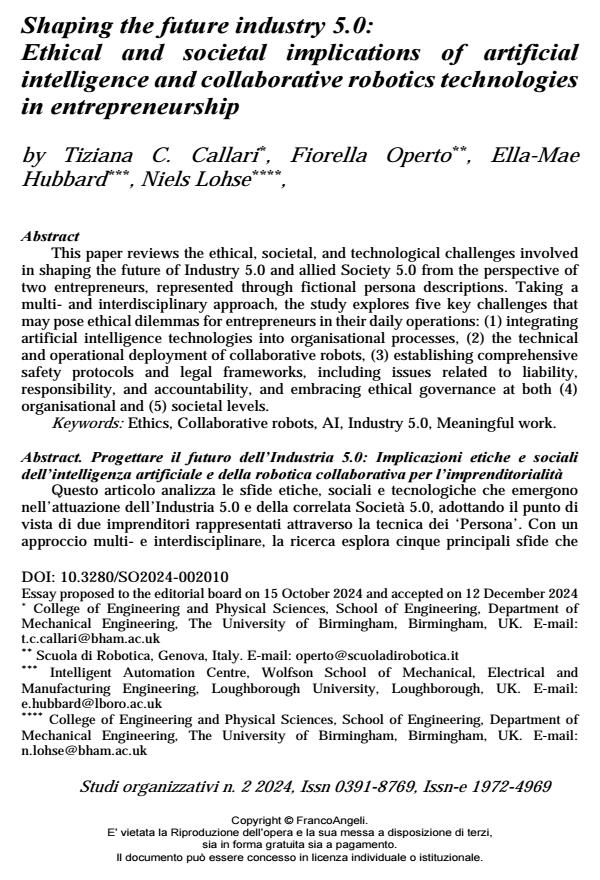Shaping the future industry 5.0: Ethical and societal implications of artificial intelligence and collaborative robotics technologies in entrepreneurship
Titolo Rivista STUDI ORGANIZZATIVI
Autori/Curatori Tiziana C. Callari, Fiorella Operto, Ella-Mae Hubbard, Niels Lohse
Anno di pubblicazione 2025 Fascicolo 2024/2
Lingua Inglese Numero pagine 27 P. 210-236 Dimensione file 222 KB
DOI 10.3280/SO2024-002010
Il DOI è il codice a barre della proprietà intellettuale: per saperne di più
clicca qui
Qui sotto puoi vedere in anteprima la prima pagina di questo articolo.
Se questo articolo ti interessa, lo puoi acquistare (e scaricare in formato pdf) seguendo le facili indicazioni per acquistare il download credit. Acquista Download Credits per scaricare questo Articolo in formato PDF

FrancoAngeli è membro della Publishers International Linking Association, Inc (PILA), associazione indipendente e non profit per facilitare (attraverso i servizi tecnologici implementati da CrossRef.org) l’accesso degli studiosi ai contenuti digitali nelle pubblicazioni professionali e scientifiche.
This paper reviews the ethical, societal, and technological challenges involved in shaping the future of Industry 5.0 and allied Society 5.0 from the perspective of two entrepreneurs, represented through fictional persona descriptions. Taking a multi- and interdisciplinary approach, the study explores five key challenges that may pose ethical dilemmas for entrepreneurs in their daily operations: (1) integrating artificial intelligence technologies into organisational processes, (2) the technical and operational deployment of collaborative robots, (3) establishing comprehensive safety protocols and legal frameworks, including issues related to liability, responsibility, and accountability, and embracing ethical governance at both (4) organisational and (5) societal levels.
Questo articolo analizza le sfide etiche, sociali e tecnologiche che emergono nell’attuazione dell’Industria 5.0 e della correlata Società 5.0, adottando il punto di vista di due imprenditori rappresentati attraverso la tecnica dei ‘Persona’. Con un approccio multi- e interdisciplinare, la ricerca esplora cinque principali sfide che possono generare dilemmi etici per gli imprenditori nelle loro attività quotidiane: (1) l’integrazione delle tecnologie di intelligenza artificiale nei processi organizzativi, (2) l’implementazione tecnica e operativa dei robot collaborativi, (3) la definizione e gestione di protocolli di sicurezza e quadri normativi, incluse le questioni legate alla responsabilità, e l’adozione di una governance etica a livello (4) organizzativo e (5) sociale.
Parole chiave:Etica, robot collaborativi, AI, industria 5.0, lavoro significativo.
- Meaningful work as shaped by employee work practices in human-AI collaborative environments: a qualitative exploration through ideal types Tiziana C. Callari, Lucia Puppione, in European Journal of Innovation Management /2025 pp.5001
DOI: 10.1108/EJIM-11-2024-1339 - Industry 5.0: The Human-Centric Future of Industry Muhammad Hammad, Hassan Ali, Ghulam Hussain, Xiaoping Wang, pp.3 (ISBN:978-3-032-12621-4)
- Reframing the narrative of workers’ agency in Industry 5.0 manufacturing through reskilling, upskilling and craftsmanship Tiziana C. Callari, Niels Lohse, in Journal of Workplace Learning /2025 pp.1
DOI: 10.1108/JWL-05-2025-0154
Tiziana C. Callari, Fiorella Operto, Ella-Mae Hubbard, Niels Lohse, Shaping the future industry 5.0: Ethical and societal implications of artificial intelligence and collaborative robotics technologies in entrepreneurship in "STUDI ORGANIZZATIVI " 2/2024, pp 210-236, DOI: 10.3280/SO2024-002010